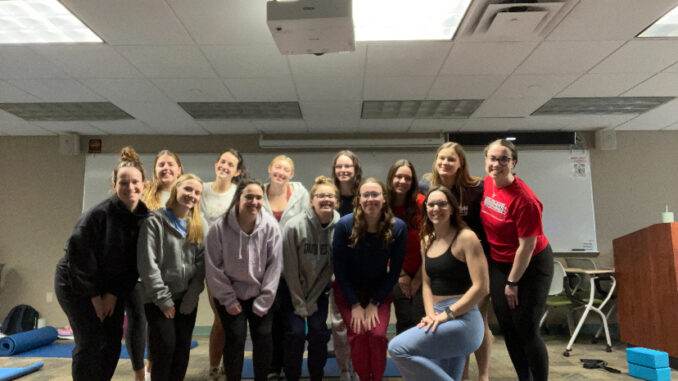
Isabella Abbott | Features Editor
A new club chapter has formed on campus, shedding light on the mental health of student athletes. Founded in 2019 by Victoria Garrick Browne, a former volleyball Division-I athlete at the University of Southern California, The Hidden Opponent (THO) is an accredited nonprofit that strives to end mental health stigma in sports culture.
Though the organization already exists at campuses and high schools in all 50 states, including some international locations, Duquesne athletes wanted to bring this awareness to the Bluff.
Madison Dickert, a swimmer for 18 years, and current Duquesne student athlete and campus captain at THO, founded Duquesne’s chapter of the mental wellness organization. She said it’s important to “spread the awareness and conversation of mental health.”
“It affects everybody at one point in their life or at least one day out of the week,” Dickert said. “And people don’t know how to have that conversation, how to help themselves, or where to look to better themselves. So, having this organization allows you to have a conversation with your coach or boss and know you’re not alone.”
As a campus captain for THO, Dickert promotes improving the culture surrounding mental health at Duquesne. She does this by hosting events, including yoga, self-love and healthy habit talks. The entire organization has more than 900 ambassadors at over 750 college campuses worldwide.
According to The Hidden Opponent’s website, although a growing number of athletes have started speaking out about their struggles, an estimated 92% of colleges still don’t have adequate support for athletes.
Another campus captain of The Hidden Opponent at Duquesne and junior swimmer Hannah Morelli struggled with mental health herself, especially when she tore her shoulder this year. She said experiencing it firsthand allowed her to appreciate the need for conversation even more.
“I think my biggest problem with mental health right now is it’s only talked about when something bad has happened,” Morelli said. “We need more preventative measures which is one of my biggest roles in this organization.”
To help bring awareness to campus, program founder Garrick Browne visited Duquesne in October 2022 and spoke about her struggles with mental health when she was a Division-I athlete herself.
Dickert organized this event with Browne, which she said was “one of the biggest privileges of her life.”
“She was just one of the nicest human beings I’ve ever met in my life,” Dickert said.
Many athletes, like Morelli, have looked up to Browne for years. Morelli was thrilled when she came to speak.
“She’s always been someone that I’ve looked up to like a role model, someone that has completely altered the standard for student athletes and mental health,” Morelli said.
“Hearing from her in person and hearing how she was able to bring to life this organization that’s for the betterment of students is amazing.”
Although the club is up and running, they’re still struggling to find members, especially male students. Currently, the Duquesne chapter only has one male member, and Morelli believes this can be attributed to the stigma surrounding men and mental health.
According to an article on Butler Hospital’s website, men are often expected to be self-sufficient and stoic, which makes it difficult for them to acknowledge their struggles and ask for help. They can also have feelings of shame and weakness when struggling with mental health issues.
“Not only are they facing issues around student-athletes in general but they’re also facing the stigma surrounding them,” Morelli said. “We want to bring them in and teach them that this is normal and it’s okay to not be okay. I think the saddest part is that people don’t feel comfortable enough or team cultures aren’t so accepting of mental health concerns like this.”
Similarly, Dickert said the club aims to destigmatize these mental health struggles.
Dickert and Morelli said anyone is welcome to join, student athlete or not, and their overall goal and hope is to create a safe environment in which they can openly discuss this topic on campus.
“There are so many people across the world in different religions and different races who all have different experiences with mental health, yet at the end of the day, there’s somebody else who experienced the exact same thing as we did,” Dickert said. “To know that somebody else is within that conversation, within that realm and within that problem is so important.”

